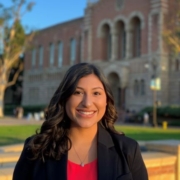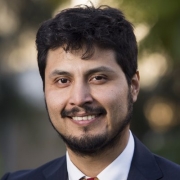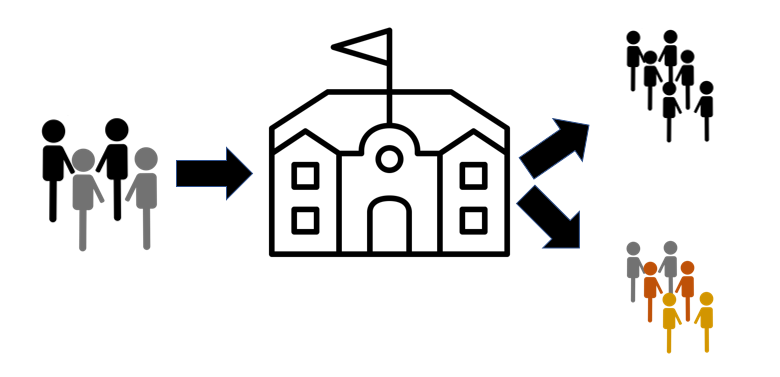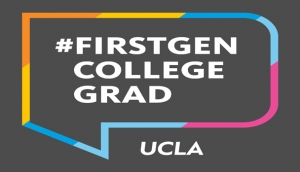By Alise Brillault, Communications Manager, UCLA Latino Policy and Politics Initiative
November 29, 2021
Young Latino leaders are key to America’s future. As California’s plurality and the nation’s second largest ethnic group, Latinos were responsible for 51% of U.S. population growth in the last decade and represent an increasingly youthful and diverse population. More than half of young Americans are people of color, and six out of ten Latinos are Millennials or younger.
Yet, Latinos are underrepresented in leadership positions and overrepresented in low-wage jobs. Latinos only account for 1.2% of elected officials in the country. During a pandemic in which Latinos have been nearly three times as likely as non-Hispanic whites to die from COVID-19, it is imperative that Latino communities see themselves and their needs reflected in political decision-making. Further, the pandemic has exacerbated pre-existing economic inequities, even while Latinos serve as the economic drivers of America. In fact, if U.S. Latinos were their own country, they would have the 7th largest GDP in the world. Ultimately, the nation’s success is predicated on Latinos’ success, and these numbers remind us how critical it is to invest in young leaders of color.
UCLA Latino Policy and Politics Initiative (UCLA LPPI) recognizes the need to harness the talent and potential of young Latino leaders to bring us to a future where we all can thrive. Through its flagship student fellowship program, UCLA LPPI is training the elected officials and organizational leaders of tomorrow to center historically marginalized communities at decision-making tables. But the policy challenges that student fellows tackle are not just résumé boosters. The issues at hand are often deeply personal to them.
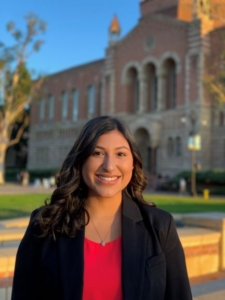
Bryanna Ruiz, Undergraduate student; Area of study: Major in political science, minor in Chicanx studies and public affairs; Expected graduation: 2022
For example, Bryanna Ruiz, an undergraduate fellow, had real worries about the health of her family members who were frontline workers. “My mother is a house cleaner, and at the beginning of the pandemic I was scared for her,” Ruiz reveals, also noting that her family did not qualify for the first rounds of CARES Act stimulus payments due to their mixed status. “In the pandemic, frontline workers were the largest impacted yet were treated as disposable.” So, for fellows like Ruiz, it has been significant to be at UCLA LPPI as they conduct research on the effects of the pandemic on essential workers of color and convene advocates and policy leaders to identify solutions for protecting those workers.
Ruiz, who is now in her fourth year as a fellow, has also gotten hands-on experience with a variety of career paths that she never previously considered — from assisting co-founder Dr. Matt Barreto with mixed-methods research on automatic voter registration to aiding the communications team with report rollouts. “As a first-generation college student, it’s hard to picture oneself in roles not exposed to growing up,” says Ruiz. “I’ve discovered, for instance, that uplifting research through strategic communications is just as crucial as the research itself.”
The work has been so rewarding that Ruiz even decided to continue with her fellowship remotely while she studies abroad in Italy during UCLA’s Fall Quarter. “I didn’t want to miss out on important research around the 2022 midterm elections and the chance to engage in a collaboration between UCLA LPPI and the University of Florida’s Samuel Proctor Oral History Program,” said Ruiz. The latter project seeks to uplift diverse Latino stories at this historic tipping point by collecting 1,000 oral histories.
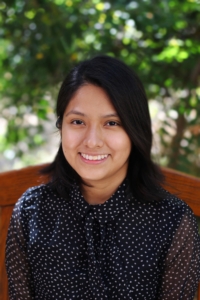
Paula Nazario, Graduate student; Area of study: MPP (Master of Public Policy); Expected graduation: 2022
Graduate Fellow Paula Nazario also feels a direct stake in shaping a new Latino narrative with her work focusing on Latino economic issues. While contributing research to a report demonstrating that Latinas exited the workforce during the pandemic more than any other group, Nazario saw the same story playing out in her community, with women being disproportionately burdened by caretaking duties as schools went remote and childcare centers closed. “I saw how the pandemic hit women particularly hard in my neighborhood — everyone was relying on them for cooking, taking care of the children, etc., so, I was able to provide my own personal insight into that report,” said Nazario.
Nazario describes how support from Latina peers and role models at UCLA LPPI is guiding her own career path. She notes, “Seeing Kassandra Hernández getting a PhD in economics is inspiring, because I had never heard of a woman of color doing that before.”
Undergraduate Fellow Moris Gomez started a beauty salon business alongside his mother during the pandemic to support his family. During the process, Gomez began learning web development so that he could create a website for the salon, which ultimately sparked a passion for programming and design. Now as UCLA LPPI’s webmaster, Gomez describes how building on these skills in his fellowship is powerful for tackling policy issues that directly affect him and his community. He explains, “The connection to the data is very important because my community members are literally in LPPI reports. Knowing this information and disseminating it in a meaningful, accessible way can help the community.”
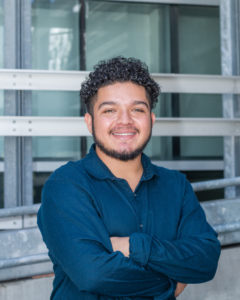
Moris Gomez, Undergraduate student; Area of study: Major in international development studies; Expected graduation: 2022
The community at UCLA LPPI also speaks to Gomez, who is undocumented. He reveals that he does not feel excluded or isolated. “I feel at home. Being surrounded by Latino professionals motivates me, and seeing Latinos with master’s degrees and PhDs makes me want to take it a step further,” said Gomez.
After graduation, Gomez wants to bring the skills he’s learned at UCLA LPPI to work that has a social justice perspective and direct impact on his community.
As America emerges from the devastation of the COVID-19 pandemic, going “back to normal” will not be sufficient for achieving true equity. “Going back to normal for Latinos is marginality,” states Juana Hernandez Sanchez, UCLA LPPI’s director of programs. “What is needed is to disrupt the status quo by leveraging existing resources for a new pipeline of young leaders of color who can return to their communities with the relevant tools to tackle long-standing policy challenges.”
UCLA LPPI plays a key role in identifying and preparing this pipeline. Student fellows are supported with technical research training and the development of interpersonal leadership skills around communication, teamwork, professional network building and setting post-graduation goals. While encouraging students to lean into their lived experiences, UCLA LPPI is helping them find their place in the policy arena and identify ways to make a tangible impact that uplifts Latino communities and expands equity and opportunity for all.

